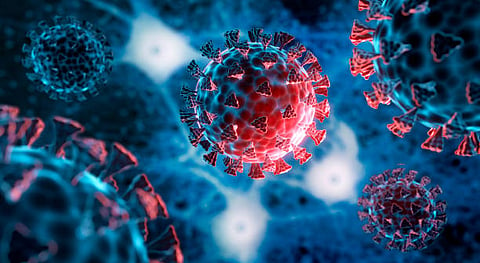

The COVID-19 is increasing panic around the world. A new variant of JN1 has already spread in India. The World Health Organization has labelled this strain of the virus as a 'variant of interest' due to its rapid spread. This time, they also issued a warning in this regard.
The number of patients has already increased in Kerala. The number of active cases in the country has increased to 2,669. Soumya Swaminathan, former chief scientist of the World Health Organization (WHO), has warned that hospitalizations may increase in this situation.
The JN1 variant of COVID is a variant of Omicron, according to WHO scientists. Researchers believe that the COVID virus has become JN1 due to continuous mutation.
However, the World Health Organization says that there is no reason to worry about JN1 right now. However, if precautions are not taken, it will start spreading the infection at a rapid rate.
Rajeev Jayadevan, chairman of the National Indian Medical Association's COVID task force, said the new strain of coronavirus in Kerala is spreading among the affected communities. "In Kochi, individuals with influenza are tested and found to have COVID-19 infection." Such reports have come in the test conducted in the last 24 hours, he said. Coronavirus has also been found in the neighbors of the victims and residents of the surrounding areas. As a result, community transmission is feared.
In addition to this, experts are expressing concern about another issue. That is to mistake a COVID infection for a common cold. Soumya Swaminathan, chief scientist of the World Health Organization, said that many people are neglecting COVID as a common cold. But if there are other diseases in the body, COVID is becoming terrible. Then the patient has to be admitted to the hospital. Even COVID can lead to multiple health problems, including heart disease, he said.
Citing the example of the COVID situation in the country, Rajeev said, ''till November, one percent of influenza-type illnesses were COVID cases. At times, it was close to zero. But that has changed since the end of November. In December, 9 percent of those sick were COVID. According to the data, many people had to be admitted to the hospital in Kochi, Kerala.''
Experts say this new subspecies of Omicron is less dangerous than Omicron. But there are fears that this subspecies could quickly spread to others. Due to this, the possibility of many people being infected in one lap cannot be ruled out. Swaminathan said hospitals should be prepared in this situation. He has advocated for oxygen and other arrangements there. However, the WHO scientist also thinks that the COVID vaccine is working. "The COVID vaccine is working. But the vaccine may not protect those who have other diseases, the elderly, or a weakened immune system."
